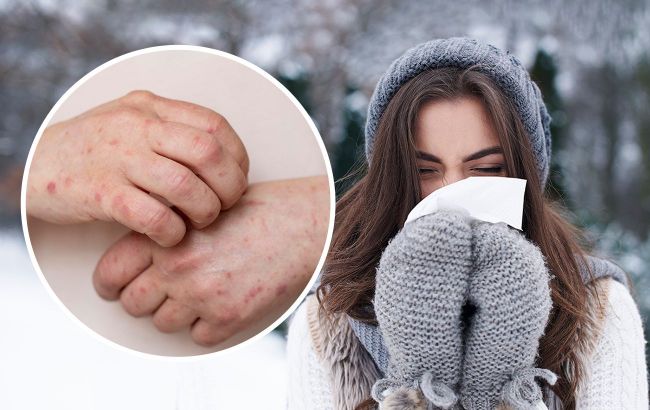Cold urticaria: Symptoms and treatment
 How cold urticaria manifests itself (photo: Freepik)
How cold urticaria manifests itself (photo: Freepik)
Human skin can react to cold and frost with chapped lips, dry hands, and redness. However, some symptoms may indicate cold urticaria, which should be properly treated, according to the medical community Take Care of Yourself.
How to diagnose
This condition is diagnosed by applying an ice cube to the skin (usually on the wrist) for 5 minutes. If after a while a blister appears at the site of application, this may indicate the presence of a cold urticaria.
This reaction of the body to cold can be acquired (develop on its own in the absence of similar cases among relatives) or hereditary, when the medical history is traced in the family.
In general, this is a fairly rare condition, and cold urticaria in the family is especially rare.
How urticaria occurs
Experts say that a reaction to cold can occur in both perfectly healthy people and those with serious illnesses. Often, it is related to immunity, when the body's immune system begins to attack its tissues and organs.
Manifestations of urticaria can disappear in a few months on their own, or they can bother a person for years.
Sometimes, cold urticaria must be a reason a person may have other diseases. For example:
- chronic lymphocytic leukemia, a type of blood cancer;
- cryoglobulinemia: a type of blood disorder;
- lymphosarcoma: cancer of the lymphatic system;
- syphilis;
- other infectious diseases, such as mononucleosis or chickenpox.
Symptoms of cold urticaria
Sometimes, the symptoms are quite mild and affect a relatively small area of the body. However, there can be severe cases. The skin reaction occurs after the person has been exposed to cold.
It may appear:
- rashes that resemble hives;
- itching;
- redness;
- swelling.
Sometimes, this is accompanied by fatigue, joint pain, fever, and headache.
In severe cases, the reaction can be more dangerous and systemic:
- loss of consciousness;
- rapid heartbeat;
- massive allergic reaction (anaphylaxis);
- difficulty in breathing.
How to treat
Antihistamines
Such drugs are used for other types of allergies. In the case of cold urticaria, they can be used both before exposure to cold to prevent an allergic reaction and after exposure to alleviate unpleasant symptoms.
Desensitization
This is a gradual accustoming of the body to cold. For example, a person can take a shower and make the water cooler and cooler. It is important to practice this only after consulting a doctor
Epinephrine injection
Injecting a hormone can slow down a severe allergic reaction. This is usually done in a hospital or outpatient clinic.
Experts also note that you can help yourself by limiting your contact with the cold:
- dress as warmly as possible and try to go out in the cold less often;
- do not drink cold drinks;
- before bathing, touch the water with your hand to understand the skin's reaction to this temperature.
If you have skin prone to dryness, do not forget to moisturize thoroughly. For this purpose, you should use special products - emollients. Dry skin is more sensitive and, therefore, more susceptible to low temperatures.
This material is for informational purposes only and should not be used for medical diagnosis or self-treatment. Our goal is to provide readers with accurate information about symptoms, causes, and methods of detecting diseases. RBС-Ukraine is not responsible for any diagnoses that readers may make based on materials from the resource. We do not recommend self-treatment and advise consulting a doctor in case of any health concerns.

